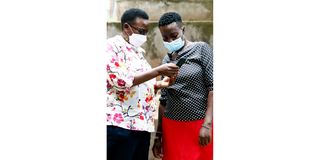Happening Now: LIVE: President Ruto address to the nation
One-stop code for GBV emergency help launched

Agnes Malesi (left) explains to Macjoy Khayali, how the short code for reporting GBV cases during the interview at the Dhobi Women Network offices in Kileleshwa on October 21, 2021.
What you need to know:
- Dhobi Women Network has launched an emergency code for gender-based violence survivors to access help.
- The USSD code *483*143# provides a one-stop platform for reporting incidents, connecting with a hospital for treatment, receiving tele-counselling, and finding a shelter.
An emergency code for gender-based violence (GBV) survivors to access help, has been launched.
The USSD code *483*143# provides a one-stop platform for reporting incidents, connecting with a hospital for treatment, receiving tele-counselling, and finding a shelter.
Developed by Dhobi Women Network, the code promotes survivors’ protection of privacy and confidentiality.
“The USSD code has incorporated the free toll lines giving multiple options in accessing emergency help,” says the network’s executive director Grace Ngugi.
She says the idea of an integrated reporting system came about in March, last year following enforcement of a partial lockdown and curfew. She would receive calls from distressed women seeking help. It proved challenging serving all at the same time considering their emergency situations that needed immediate attention.
“Now with Sh3, one can access the platform confidently and get help from wherever they are across the country,” she says.
Community policing
She notes that the code promotes community policing on GBV issues since anyone can report the crime and facilitate a rescue mission without disclosure of the informant.
Helplines for public litigation labour and children’s rights as well as psychosocial support are also available on the platform. Others are for human rights violations, persons with disability, migrants, widows and orphans.
Kileleshwa chief Joyline Gatakaa, says the platform will improve reporting violence in the community.
“Many times, violence occurs in the homes and community but people fear visiting the relevant government offices to report for fear of reprisal attacks,” she says.
Should one, however, lack a phone or means to a phone to access the service, there are other options.

An image showing how the short code for reporting gender-based violence cases works.
Nyumba Kumi members, human rights monitors and grassroots activists are of great help to GBV survivors.
Apart from chiefs, Nyumba Kumi members are the closest administrative officers in the villages. It is important to seek out their help instead of feeling powerless or suffering in silence. They are pivotal in not only rescuing survivors, but also safeguarding the evidence needed to successfully prosecute a GBV case.
Nyumba Kumi
For instance, it is through the Nyumba Kumi members that rescued girls and women are placed in shelters and safe houses.
Human rights monitors live among the people and they are usually known to the community members. Often, they are trained as paralegals by the civil society organisations, and can offer guidance on the best action to take.
They are also trained on confidentiality and documenting offences such as GBV. Since they work in a coordinated system involving the police, they can easily rescue the survivor once notified. It is easy to identify them by consulting the chief, clergy and teachers.
They exist both in rural and urban areas, especially in Nairobi, Nakuru, Kisumu, Narok, Uasin Gishu, Samburu and Laikipia among other areas.
With the emergence of community-based organisations in every sub-county in Kenya, grassroots activists are in plenty.
The media has also covered activists who are saving girls from early marriages and female genital mutilation. They are saviours in cases of dire need for help.
Look around your community, they may be closest than you think.





